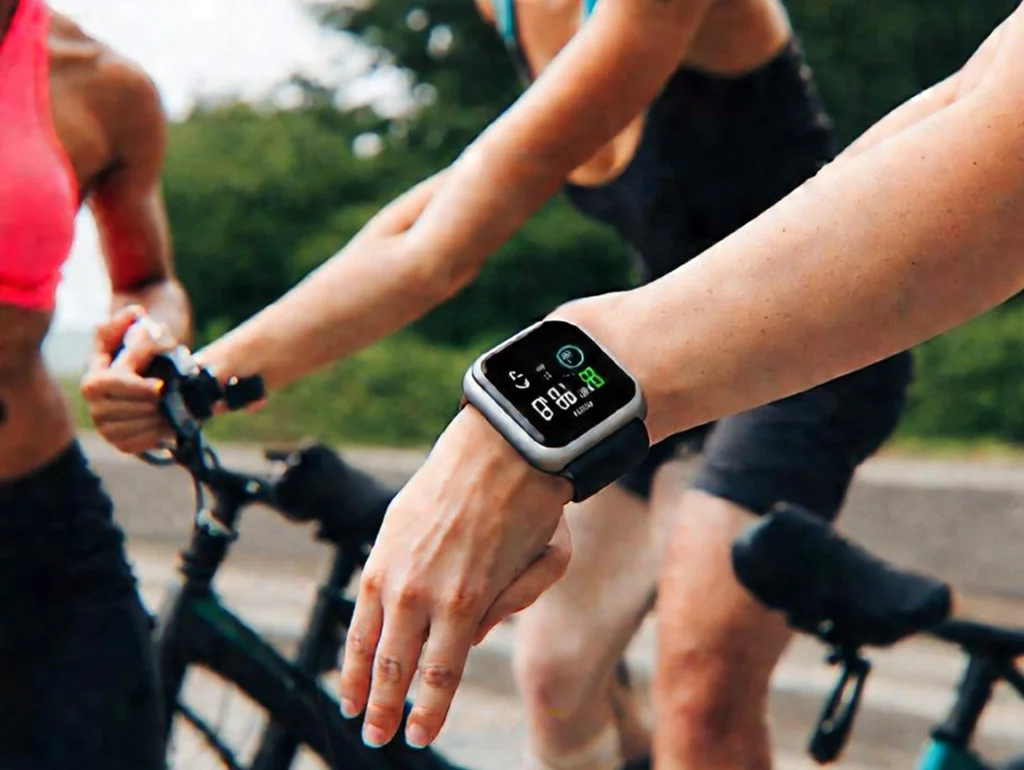
A Comparison of Samsung, Apple, Garmin and Fitbit
I keep saying you’ve got to move, but how do you track if you’re meeting your goals?
Since their inception, smartwatches have evolved significantly, transforming from basic pedometers to sophisticated wearable devices offering comprehensive health insights. Their growing popularity can be attributed to an increasing public interest in health and wellness, coupled with advancements in technology that enable users to monitor various aspects of their fitness easily. As a result, the fitness tracker market has witnessed a surge in demand, with consumers seeking devices that not only track their physical activity but also provide relevant health information.
The intersection of technology and fitness has led to innovations such as heart rate monitoring, calorie tracking, sleep analysis, and GPS capabilities. These features empower users to make informed decisions about their health and fitness regimens. Moreover, many fitness trackers now integrate seamlessly with mobile applications, allowing for a more personalized experience through insights and recommendations based on collected data. This shift towards a data-driven approach to fitness has attracted a diverse user base across different age groups and fitness levels.

Among the key players in this competitive market are Samsung, Apple, Fitbit, and Garmin. Each of these brands distinguishes itself with unique selling points targeting various consumer needs. Samsung, for example, integrates fitness tracking with smart technology, making it appealing for users who value connectivity. Apple emphasizes health-centric features that integrate with its ecosystem, attracting individuals who prioritize comprehensive health monitoring. Fitbit has solidified its reputation as a leader in accessible and user-friendly fitness solutions, focusing on promoting active lifestyles. Lastly, Garmin caters to a specific audience that includes serious athletes and outdoor enthusiasts, offering advanced GPS capabilities and robust performance tracking. Together, these brands set the stage for an in-depth examination of their fitness trackers, highlighting the features and enhancements that define their offerings in the ever-evolving fitness landscape.
Feature Comparison: Samsung vs. Apple vs. Fitbit vs. Garmin
When evaluating fitness trackers, several critical features must be considered to determine which device best fits an individual’s needs. Heart rate monitoring is one crucial aspect, and all four brands—Samsung, Apple, Fitbit, and Garmin—offer reliable heart rate tracking. Fitbit is particularly renowned for its accurate continuous heart rate data, coupled with the ability to provide insights into resting heart rates. On the other hand, Apple Watch also excels with advanced heart monitoring through its ECG feature, appealing to those needing comprehensive heart health management.
GPS capabilities are another essential consideration. Garmin leads this area, providing excellent GPS accuracy for outdoor activities, which makes it ideal for runners and cyclists. Samsung has made significant strides in GPS tracking, but it may not be as precise as Garmin’s offerings. Apple Watch includes GPS as well, suitable for those who prefer an all-in-one smart device. Fitbit’s GPS integration is only available in select models, such as the Charge series, which may limit options for dedicated outdoor enthusiasts.
Battery life varies significantly among these brands. Fitbit generally boasts the longest battery life, often lasting multiple days, making it convenient for users who wish to minimize charging interruptions. Conversely, both Apple and Samsung smartwatches often require daily charging due to their rich feature sets and vibrant displays. However, Garmin devices can provide an excellent balance between smart features and impressive battery longevity that can last weeks on a single charge, especially in smartwatch mode.
Activity tracking is a focal point for all brands, each offering various metrics beyond standard step counting. Both Garmin and Fitbit provide comprehensive fitness analytics, including different workout profiles and recovery metrics. Samsung and Apple also include fitness tracking but may cater more towards casual fitness enthusiasts rather than hardcore athletes.
App integration ties together the user experience across all devices. Apple’s integration with the iOS ecosystem is seamless, allowing for smooth transitions between devices. Fitbit’s Health App provides a wealth of metrics, fostering community interaction. Garmin Connect is robust for serious athletes, while Samsung Health has expanded its functionalities significantly. Each platform has unique strengths that cater to different user preferences.
Price and Value: Assessing Cost vs. Benefits
In the ever-evolving landscape of fitness trackers, understanding the price-to-value ratio becomes crucial for consumers aiming to make informed choices based on their fitness goals and budgets. Samsung, Apple, Fitbit, and Garmin each present a unique pricing strategy that reflects their distinct brand positioning and product features. When considering the investment in a fitness tracker, it is important to evaluate how well the offered features align with the pricing, thus ensuring a worthwhile expenditure.
Samsung typically positions its fitness trackers at a competitive price point without compromising essential features. Their products often include advanced health monitoring capsulated in sleek designs, making them favorable options for individuals seeking style alongside utility. Additionally, Samsung’s integration with its ecosystem provides added value for users of other Samsung products.
On the other hand, Apple devices often command a premium price, justified by their extensive functionalities, such as seamless connectivity with other Apple devices and comprehensive health metrics. However, this higher price tag may not be suitable for all users, especially those whose fitness needs are more basic.
Fitbit provides various models that cater to a wide range of budgets, making it accessible for a broad audience. Its fitness trackers are known for their user-friendly interfaces and solid performance, leading to significant value, particularly for those prioritizing fitness over extensive smart features.
Garmin typically targets more serious athletes with its fitness trackers, whose prices mirror specialized functionalities like advanced GPS tracking and performance analytics. These tracker features are specifically designed to enhance the training experience for dedicated users, making them worth the investment.
Ultimately, assessing price against benefits is essential in selecting a fitness tracker that not only fits personal budgets but also effectively supports individual fitness goals. Each brand excels in different areas, ensuring that consumers can find a product that meets their needs without unnecessary overspending.
User Experience and Reviews
When evaluating the best fitness trackers of 2023, user experiences and reviews play a pivotal role, offering insights into real-world usage across various brands. Each brand has garnered a loyal user base, and an analysis of their feedback reveals distinct advantages and disadvantages.
Starting with Samsung, PCMag has done all the legwork for you, and here are their top picks.
Apple’s offerings, particularly the Apple Watch Series, are lauded for their robust ecosystem and user-friendly interface. Users frequently highlight the watch’s health-monitoring features and third-party app integrations. However, there have been mentions of its somewhat bulky feel and premium price point, which could deter potential buyers. Furthermore, some users expressed concern regarding battery life, as heavy app usage requires more frequent charging. Here are the top three Apple Watches according to TechRadar.
Garmin is often highlighted for its durability and advanced features, particularly among serious athletes. Many users praise its precise GPS tracking capabilities and extensive workout statistics. However, some have noted that the learning curve can be steep, particularly for those unfamiliar with advanced fitness tracking technology. These are the Top 3 Watches as picked by LiveScience.
Fitbit‘s range of fitness trackers has consistently been a favorite among health enthusiasts. Users appreciate the detailed activity tracking and the community-oriented features that foster support and motivation. While the comfort and durability of Fitbit devices are generally well-regarded, some users have reported issues with long-term wear, noting that the bands may show signs of wear and tear over time. Business Insider has the inside on the best models.
In conclusion, while each brand has its strengths and weaknesses, user experiences indicate that personal preferences and intended use significantly influence satisfaction with each fitness tracker. Evaluating these testimonials is essential for making an informed purchase decision based on one’s specific fitness goals and lifestyle requirements. I’ve personally used Fitbit for over a decade. When my Fitbit dies, as they all do, they either give me a new one or 50% off the latest models. their customer service is fantastic!
Happy moving!



![Apple Watch Series 10 [GPS 46mm] Smartwatch with Rose Gold Alumin...](https://m.media-amazon.com/images/I/415Sfz6z4BL.jpg)
![Apple Watch Ultra 2 [GPS + Cellular 49mm] Smartwatch with Rugged ...](https://m.media-amazon.com/images/I/51W0-BXu+eL.jpg)
![Apple Watch SE (2nd Gen) [GPS + Cellular 40mm] Smartwatch with Mi...](https://m.media-amazon.com/images/I/31j1r7de+ML.jpg)





